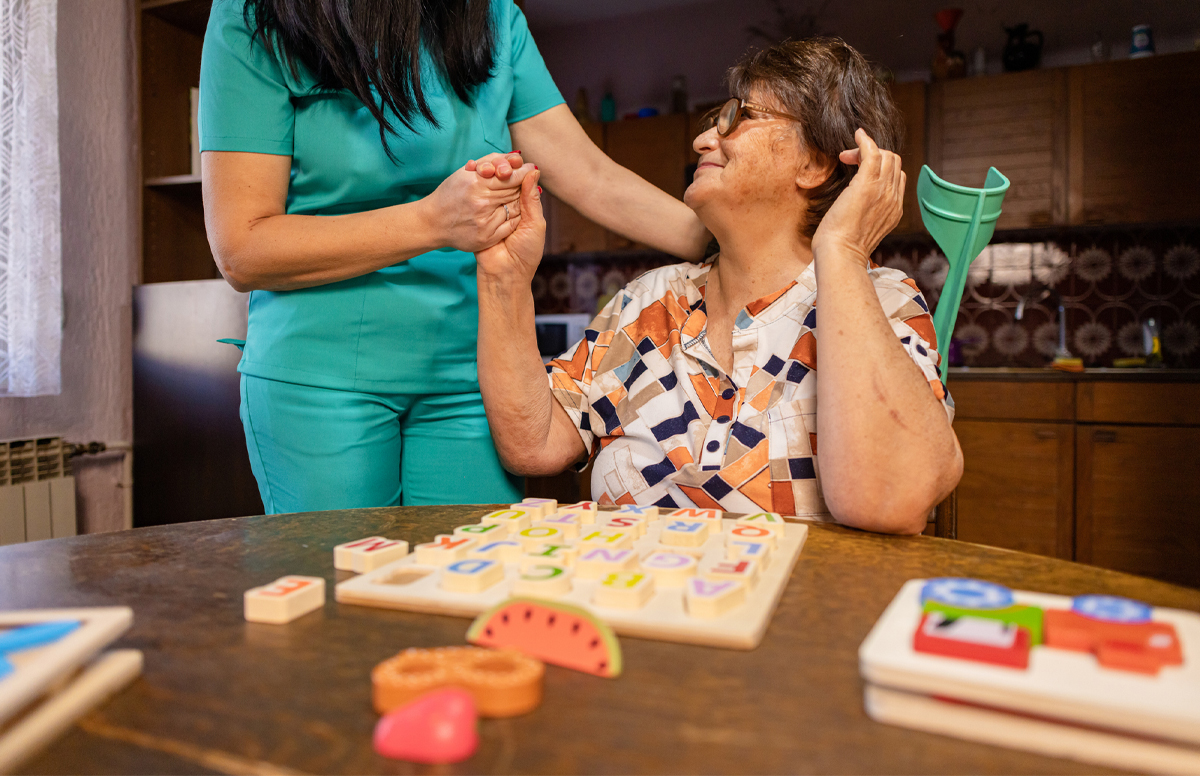
As Vice President, Shared Learning Initiatives, LeadingAge’s Kirsten Jacobs reviews a wide range of research and education activities and collaborates with members, experts, and researchers to develop live and on-demand programs that help members in their ongoing efforts to improve care. A longtime proponent of creative engagement in dementia care, here, she describes recently published research from a study in which LeadingAge member United Church Homes participated.
LeadingAge: A study published in the August 2025 Journal of the American Medical Directors Association presents research findings of the Individualized Positive Psychosocial Interaction (IPPI) program. What is IPPI?
Kirsten Jacobs: The Individualized Positive Psychosocial Interaction (IPPI) is an evidence-based program to improve quality of life for people living with dementia through one-on-one preference-based activities.
The IPPI program offers over 60 unique protocols that provide practical, easy-to-follow ways for care partners to engage with people living with dementia (PLWD). Each protocol is matched to the individual’s preferences—routinely assessed by team members—ensuring that interactions are both meaningful and personalized. For instance, if a resident enjoys games, a care partner might choose a jigsaw puzzle activity tailored to that person’s interests and abilities, such as using large-piece puzzles. These brief, one-on-one sessions are designed to offer enjoyable, preference-based engagement while helping to reduce distress and depressive symptoms. Dr. Katy Abbott, Professor of Gerontology and Executive Director, Scripps Gerontology Center, who is one of the study researchers, shares the IPPI program basics in our free-for-LeadingAge members QuickCast.
LeadingAge: In your role as vice president, shared learning initiatives, you’ve explored residential care for people who are living with dementia from various approaches–through the lens of ‘dementia inclusion,’ for instance, as well as the exploration of promising practices versus evidence-based ones. What about these IPPI findings are noteworthy?
Kirsten Jacobs: Long-term care team members can find it challenging to engage residents living with dementia in satisfying and meaningful day-to-day activities. Amy Kotterman, RDN, LD, Director of Customer Experience at our member United Church Homes, Marion, OH, whose team members and residents at nine communities participated in the IPPI research, explains that behavioral expressions—such as persistent vocalizations and resistance to care—affect 78% of people living with dementia. Additionally, 30% of nursing home residents experience depressive symptoms, and nearly half of those also have dementia. Without proper training, care partners can struggle to support overall well-being amid the challenges of dementia.
The IPPI research provides data to back up what many of us may see anecdotally: through certain types of engagement, nursing home residents experience more pleasure, alertness, engagement, and positive verbal behavior. That’s what’s groundbreaking, she says.
The study conducted with United Church Homes found that the IPPI program improved resident mood in 47% of sessions. Even more striking: in 97% of sessions, team members reported the interaction as a meaningful use of their time.
LeadingAge: How does the IPPI program align with current best practices in person-centered dementia care?
Kirsten Jacobs: The IPPI program is built around brief, one-on-one activities, tailored to each resident’s personal preferences–such as music, pets, or conversation topics. This aligns with the core idea of person-centered care: honoring the individual’s unique identity, history, and interests. Just like anyone else, people living with dementia may be more drawn to one activity than another in any given moment. This program allows care partners to meet the individual’s mood and interests. The program includes training for care partners in emotion-focused communication, helping them better recognize and respond to residents’ emotional states.
LeadingAge: What do you see as the biggest opportunities or barriers to scaling a program like IPPI across long-term care settings? How does IPPI address needs in current research, or understanding of, best practices in dementia care?
Kirsten Jacobs: The program doesn’t need a ton of tools to be useful. That makes it easily scalable across diverse care settings. IPPI supports quality goals by offering a structured, preference-based, non-pharmacological approach to dementia care. Some barriers could include staffing shortages and turnover, having a lack of time and reliance on team members. However, the brief activities with clear instructions make it much more possible for a care partner to have positive one-on-one interactions. We know that not all team members always feel equipped to engage residents with dementia in emotionally supportive ways, ongoing education can be an antidote to that challenge.
LeadingAge: Nine communities at LeadingAge member United Church Homes participated in this research. How common is member participation in dementia care research and program development?
Kirsten Jacobs: We have a number of LeadingAge members who participate in research by partnering with educational institutions and/or other nonprofits. These organizations see research participation as a meaningful way to positively impact the field while improving quality of life within their communities. As UCH study participant Amy Kotterman put it, UCH is “all about learning.” By being a learning organization, UCH is enhancing engagement opportunities within their organization and well beyond. The thought that she had was, “How can we do things better?”
LeadingAge: What can providers expect to gain from the QuickCast on the LeadingAge Learning Hub if they’re exploring individualized positive psychosocial interactions for people living with dementia?
Kirsten Jacobs: Providers exploring IPPI for people living with dementia can expect to gain several valuable takeaways with Scripps’ Dr. Katy Abbott, starting with a clear introduction into the IPPI program and how it works. Drawing from the experience of UCH and the research team behind the study, the QuickCast shares practical lessons from how IPPI was introduced across nine nursing homes–successes, the barriers to implementation that emerged and how those were addressed–making it especially useful for providers considering implementation in their own setting. After you view the QuickCast, check out the IPPI website, here.

 Shutdown Week Three: Impact of Ongoing Closure on Affordable Housing
Shutdown Week Three: Impact of Ongoing Closure on Affordable Housing Colleagues on the Move, February 18, 2026
Colleagues on the Move, February 18, 2026



